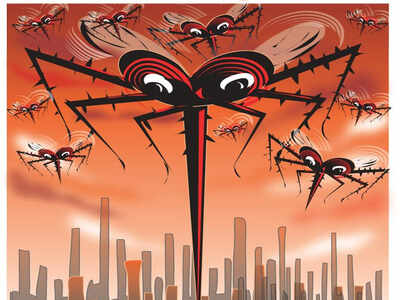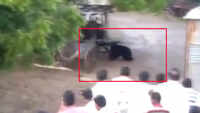
THANE: The municipal health administration has launched a massive drive against malaria by conducting house-to-house surveillance. The officials have also been identifying mosquitoe breeding spots across the city and are carrying out fumigation.
This is being done in order to control the spread of the vector-borne disease. The city has seen a rise in the number of malaria and dengue fever cases, including the death of a 13-year-old girl from Vartak Nagar earlier this month.
In fact, the door-to-door survey showed that of the 122 fever cases registered up to July 24, as many as 52 patients were tested positive.
Officials from the civic health department said that in most cases the breeding spots are either inside resident's homes or within the vicinity. The parasites multiply in stagnant water and swamp areas. In homes where water is stored for a longer duration or flower pots where water get accumulates are also breeding spots for mosquitoes.
"After the tragic death of 13-year-old Shreya Yadav, our entire department is on high alert. We are collecting blood samples of all suspected patients who have been suffering from fever for a long time or show symptoms of the disease. Also, whenever we come across any suspected patients, we make sure to carry out fogging in those areas immediately. Apart from this, the staff carrying out fogging and spraying pesticides across the city on a daily basis. They also make it a point to check around 150 to 200 homes a day. But residents must also ensure that there are no breeding spots in their homes. They shouldn't keep any scrap wherein water can be collected. Even plates must not be kept under plants as water gets collected in them," said Dr Haridas Gujar, medical health officer at TMC.
However, the authorities, too, face a lot of problems at times as many societies do not cooperate and don't allow them to check their premises.
It is learnt that while there were around 10 suspected cases in June, none were detected positive. The cases started increasing in July as it started raining heavily then.
"When it is continuously raining, the eggs laid by mosquitoes get washed away. But if there is a wet and dry spell, then they again form breeding spots. This kind of pattern was witnessed in July due to which the number of patients increased after the first week," said a senior officer from the TMC.
The authorities have asked people to inform them if they find any breeding spots. Residents have also been asked to keep their homes free of breeding spotsand not take self medication if the fever lasts for long. They must immediately visit a doctor, said a city-based physician.
This is being done in order to control the spread of the vector-borne disease. The city has seen a rise in the number of malaria and dengue fever cases, including the death of a 13-year-old girl from Vartak Nagar earlier this month.
In fact, the door-to-door survey showed that of the 122 fever cases registered up to July 24, as many as 52 patients were tested positive.
Officials from the civic health department said that in most cases the breeding spots are either inside resident's homes or within the vicinity. The parasites multiply in stagnant water and swamp areas. In homes where water is stored for a longer duration or flower pots where water get accumulates are also breeding spots for mosquitoes.
"After the tragic death of 13-year-old Shreya Yadav, our entire department is on high alert. We are collecting blood samples of all suspected patients who have been suffering from fever for a long time or show symptoms of the disease. Also, whenever we come across any suspected patients, we make sure to carry out fogging in those areas immediately. Apart from this, the staff carrying out fogging and spraying pesticides across the city on a daily basis. They also make it a point to check around 150 to 200 homes a day. But residents must also ensure that there are no breeding spots in their homes. They shouldn't keep any scrap wherein water can be collected. Even plates must not be kept under plants as water gets collected in them," said Dr Haridas Gujar, medical health officer at TMC.
However, the authorities, too, face a lot of problems at times as many societies do not cooperate and don't allow them to check their premises.
It is learnt that while there were around 10 suspected cases in June, none were detected positive. The cases started increasing in July as it started raining heavily then.
"When it is continuously raining, the eggs laid by mosquitoes get washed away. But if there is a wet and dry spell, then they again form breeding spots. This kind of pattern was witnessed in July due to which the number of patients increased after the first week," said a senior officer from the TMC.
The authorities have asked people to inform them if they find any breeding spots. Residents have also been asked to keep their homes free of breeding spotsand not take self medication if the fever lasts for long. They must immediately visit a doctor, said a city-based physician.
World Cup 2019
Trending Topics
LATEST VIDEOS
More from TOI
Navbharat Times
Featured Today in Travel
Quick Links
Lok Sabha Election Schedule 2019Lok Sabha Election NewsDelhi Capitals teamMI team 2019Rajasthan Royals 2019RCB team 2019Maharashtra Lok Sabha ConstituenciesBJP Candidate ListBJP List 2019 TamilnaduShiv Sena List 2019AP BJP List 2019Mamata BanerjeeBJP List 2019 MaharashtraPriyanka GandhiBJP List 2019 KarnatakaAMMK Candidate List 2019BJP List 2019 WBLok Sabha Elections in Tamil NaduBSP List 2019 UPNews in TamilLok Sabha Poll 2019Satta Matka 2018PM ModiMahagathbandhanNagpur BJP Candidate ListChandrababu NaiduTamil Nadu ElectionsUrmila MatondkarNews in TeluguMadras High CourtTejashwi YadavArvind KejriwalTejasvi SuryaPawan KalyanArvind KejriwalYogi AdityanathJaya PradaSatta King 2019Srinagar encounter
Get the app







